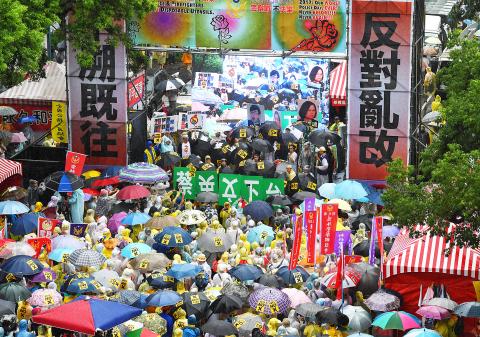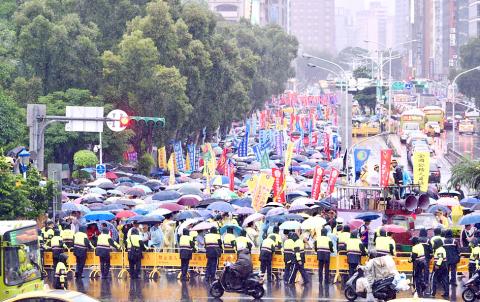Thousands of pensioners yesterday marched on the Legislative Yuan in Taipei to protest proposed pension cuts as an extraordinary legislative session on reform began.
A steady downpour failed to deter hordes of retired public-school teachers, civil servants and military personnel from packing Jinan Road and portions of neighboring side streets for several hours, maintaining a steady staccato of whistle-blowing and chants for President Tsai Ing-wen (蔡英文) to step down.
“We have to let the government know that even the rain cannot extinguish our anger,” said retired lieutenant general Wu Sz-huai (吳斯懷), one of the spokesmen for a small cohort of retired military personnel who have camped outside the Legislative Yuan for months.

Photo: CNA
Turnout estimates by protest leaders ranged from 15,000 to 30,000, with parts of Zhongxiao E Road and Zhongshan S Road blocked off as the protesters marched from the Legislative Yuan to the National Police Agency, the Executive Yuan and the Presidential Office Building, singing Martial Law-era tunes, such as Unity is Strength and the Central Police University anthem.
“The government has to keep its word, not apply reforms retroactively and not make a mess of reform,” Keng Chi-wen (耿繼文), a former director of the National Police Agency Internal Affairs Office, said from a loudspeaker truck outside the agency building.
Protesters placed flowers on the barricades or fences, with Taiwan Police and Firefighters Alliance head Chen Ho-liang (陳合良) delivering a bouquet to the assembled police officers.

Photo: Peter Lo, Taipei Times
The crowd had rapidly thinned to several hundred after the protesters made their way to Ketagalan Boulevard and back to the Legislative Yuan.
The scope and depth of police defenses continued to break new records, with multiple layers of barricades outside the entrances and alleys around the Legislative Yuan, with neighboring Qingdao Road (青島路) completely blocked off.
Long lines of police officers shadowed protesters throughout their march, with special barricades erected along the Zhongxiao Road and Zhongshan Road intersection to prevent demonstrators from attempting to repeat a previous occupation of the legislative compound.
While officially timed to coincide with Police Day, yesterday’s protest also came as the Legislative Yuan reopened deliberations on pension reform, beginning a new extraordinary session following a brief recess.
Numerous members of the Chinese Nationalist Party (KMT) addressed the demonstrators, with KMT caucus convener Sufin Siluko (廖國棟) promising to reject retroactive application of pension reform and to press for a single unitary package that includes a “humanitarian clause” exempting people over a certain age or with disabilities.
National Federation of Teachers’ Unions director-general Huang Yao-nan (黃耀南) called for reforms for all affected groups to be passed together, as well as the simultaneous passage of legislation reforming pension fund management to boost returns.
While reforms aimed at both teachers and civil servants have already passed into cross-caucus talks, the committee review has yet to begin for reforms aimed at ordinary workers and the Executive Yuan has yet to publish an official version of the reforms for military personnel.

SECURITY: As China is ‘reshaping’ Hong Kong’s population, Taiwan must raise the eligibility threshold for applications from Hong Kongers, Chiu Chui-cheng said When Hong Kong and Macau citizens apply for residency in Taiwan, it would be under a new category that includes a “national security observation period,” Mainland Affairs Council (MAC) Minister Chiu Chui-cheng (邱垂正) said yesterday. President William Lai (賴清德) on March 13 announced 17 strategies to counter China’s aggression toward Taiwan, including incorporating national security considerations into the review process for residency applications from Hong Kong and Macau citizens. The situation in Hong Kong is constantly changing, Chiu said to media yesterday on the sidelines of the Taipei Technology Run hosted by the Taipei Neihu Technology Park Development Association. With

CARROT AND STICK: While unrelenting in its military threats, China attracted nearly 40,000 Taiwanese to over 400 business events last year Nearly 40,000 Taiwanese last year joined industry events in China, such as conferences and trade fairs, supported by the Chinese government, a study showed yesterday, as Beijing ramps up a charm offensive toward Taipei alongside military pressure. China has long taken a carrot-and-stick approach to Taiwan, threatening it with the prospect of military action while reaching out to those it believes are amenable to Beijing’s point of view. Taiwanese security officials are wary of what they see as Beijing’s influence campaigns to sway public opinion after Taipei and Beijing gradually resumed travel links halted by the COVID-19 pandemic, but the scale of

A US Marine Corps regiment equipped with Naval Strike Missiles (NSM) is set to participate in the upcoming Balikatan 25 exercise in the Luzon Strait, marking the system’s first-ever deployment in the Philippines. US and Philippine officials have separately confirmed that the Navy Marine Expeditionary Ship Interdiction System (NMESIS) — the mobile launch platform for the Naval Strike Missile — would take part in the joint exercise. The missiles are being deployed to “a strategic first island chain chokepoint” in the waters between Taiwan proper and the Philippines, US-based Naval News reported. “The Luzon Strait and Bashi Channel represent a critical access

Pope Francis is be laid to rest on Saturday after lying in state for three days in St Peter’s Basilica, where the faithful are expected to flock to pay their respects to history’s first Latin American pontiff. The cardinals met yesterday in the Vatican’s synod hall to chart the next steps before a conclave begins to choose Francis’ successor, as condolences poured in from around the world. According to current norms, the conclave must begin between May 5 and 10. The cardinals set the funeral for Saturday at 10am in St Peter’s Square, to be celebrated by the dean of the College